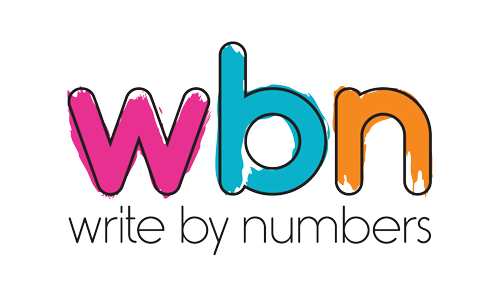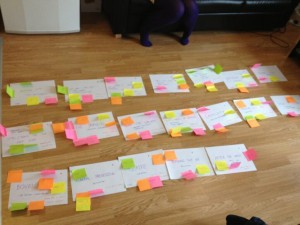In just over a week’s time Blueprint will be performed in what is its finished version. That will be almost three years from when I wrote the first lines of the play and there’s probably quite a lot I, as the writer, could say about the time between those two points. But, given the timescale, possibly the most important thing were the reasons why I wanted to write this play – and why I kept on writing it over this period. Some are sensible reasons and some are verging on the ridiculous. They’re all important.
Some things you should know in order for this to vaguely make sense: Blueprint tells the life story of a character named Kate as filtered by her dying brain. It consists of ‘an intro’, forty-four moments (originally minutes) from her life, and a ‘conclusion’. The moments are not linear, though (in our version) we have set an order.
I wrote Blueprint because…
I was set a challenge:
In 2011 I wasn’t doing much any creative writing (though I was doing a bit of arts journalism); I was mainly producing and project managing and didn’t feel like much of a writer. That Edinburgh Fringe, where I was producing a show, general agitator Christopher Brett Bailey set me a challenge: I was to write a play that August. Obviously, I didn’t actually manage to do that because, hello, producing a show at Edinburgh Fringe (and also: all the vodka). But I came up with concept for Blueprint, and plotted out the first fifty minutes and, in November, once I’d finished producing the Edinburgh show’s London run I started writing Blueprint.
I had an image for a play:
It was of a woman on a stage, surrounded by pieces of paper. I knew these pieces of paper had something to do with her identity, and her keeping hold of them was important. I now think that’s maybe a slightly different play, but the feeling that conjured is really important to Blueprint. In Blueprint each moment (as the minutes became) is both part of the jigsaw of who Kate is and the moment that brings her closer to her death.
I wanted to write in styles I didn’t normally get to write in:
The structure of Blueprint, with its forty-four moments, combined with the idea that the play is the product of Kate’s dying brain automatically gives room for different minutes to be different styles. And, in draft one I had such fun with this, parts of the play reading like my list of people who’ve made things I love. There’s a moment that’s a homage to Bryony Kimmings, one for Alan Bennett, there’s a particularly niche homage to Tom Stoppard’s Hapgood, one for Deborah Pearson, one for Ben Moor, one for any performer I’ve ever seen attempt something physically preposterous on stage, a couple which are more ‘spoken word’, and several that are a loving nod to Martin Crimp (but, Attempts on her Life is probably my theatrical bible so in some way I suspect all of Blueprint is a loving nod to Crimp). A good chunk of these exited the play when I realised what I was actually writing about (it took me a mere four drafts, two weeks of workshop development in a theatre and three years to discover this properly). Also, and this bleeds into one of the other reasons (one which I only discovered at the Bike Shed in October), this play is ultimately written by me and not anyone else so it should be written only the way I would write it. But allowing me the freedom to try things on for fit was brilliantly liberating and important for where Blueprint has ended up.
I wanted to write a text that encouraged – indeed demanded – the director and performers play with it:
Blueprint is so-called because it was, right up until the Bike Shed’s print deadline, known by the title ‘As Yet Untitled Blueprint for Performance’. The title has stuck for other reasons (it’s become Kate’s blueprint for her life) but the text itself retains the earlier intention. We’ve chosen particular ways of staging it, but you could make a whole different set of decisions (from how many performers there are, through how lines are assigned, right down to the order of the moments in the play). If Blueprint were to be made available for other people to perform then there’s even some text we haven’t used that would probably go in an appendix, as an optional extra depending on interpretation. It’s incredibly fun – and liberating – as a writer to do this.
I wanted to write a great, complicated, funny, poetic role for a woman:
Because I so rarely see great, complicated, funny, poetic women portrayed on stage in what is termed ‘new writing’. It makes me despair. The last two large scale character pieces I’d contributed words to – Beneath the Albion Sky and Reasons for Listing – gave (I think) two great, complicated, funny, poetic in one case, resolutely not in the other, roles for men. So I wanted to give an even more complicated, unusual role for a woman. Samantha Baines, who came on board having only read the mish-mash first draft, embues Kate with all those things. And, as I love knowing the actor I’m writing for, I wanted to write a character which lived up to all the things that Sam can do.
I wanted to say some stuff about belief:
When I first started writing Blueprint I thought it might be (and don’t snigger here) a performative essay about character and how it’s created, then I realised that was an academic exercise and I’d fallen in love with Kate so I wanted it to be about her and all the things that made her Kate (albeit with the gaps of all the not-knowing we have to do as an audience). The day of the first work-in-progress showing, Andy asked how I was feeling given how much of me was in the play. I batted this away, there were only a few bits of my life in there. Only when I was sat watching the show that evening did I realise what he was actually talking about. Kate and I are very different people but the world view which seeps through the play is one we share. If it made me feel a bit naked, then it’s because Blueprint is me standing next to Kate, working out what I believe alongside her, and then attaching my name to it.
I wanted to learn about lots of things:
The play gave me an excuse to learn about bits of science that I hadn’t looked at since the early part of this century. That multiple people asked me after the work-in-progress showings asked me if I was a Physicist made my year. I’m not by some distance, but I should probably thank my A Level Biology teachers for equiping me with the confidence to think I might be able to understand at least a little bit of scientific thought.
It’s part of the ongoing conversation I’m having with Virginia Woolf:
So, yes, she doesn’t know that we’re having this conversation but that doesn’t make it any less important, because we all have one way conversations all of the time (I remember Carl Barat once being asked if he still had conversations with Pete Doherty and responding “only in the way you do with someone you no longer speak to, only in my head” and I think that sums it up perfectly). I first read Woolf aged 18 and I’ve been talking to her in my writing ever since, though I suspect Blueprint is the loudest conversation I’ve ever had with her. Charlie and I even talked about whether we could get the play’s epigraph (which is from Woolf’s novel The Waves) into the play. We can’t because Kate has never read Woolf so it wouldn’t be in her head. But I have so it’s one of my reasons:
“Life is not susceptible perhaps to the treatment we give it when we try to tell it.”
And in some way I think Blueprint is my trying to find a new treatment for telling it.
 We like theatre. We like words. So here are words (50 or fewer to be exact) about theatre we have seen recently. (Next time we’ll publish them before the shows concerned close and everything).
We like theatre. We like words. So here are words (50 or fewer to be exact) about theatre we have seen recently. (Next time we’ll publish them before the shows concerned close and everything).
